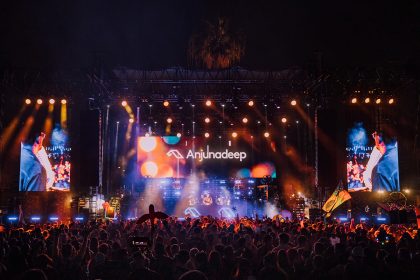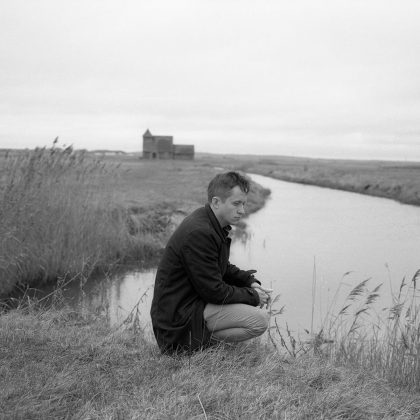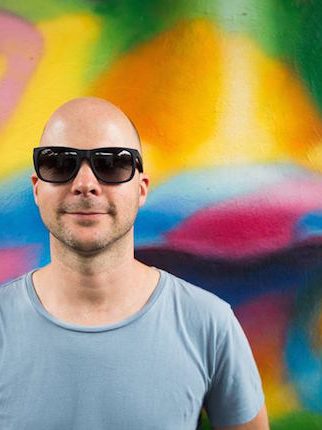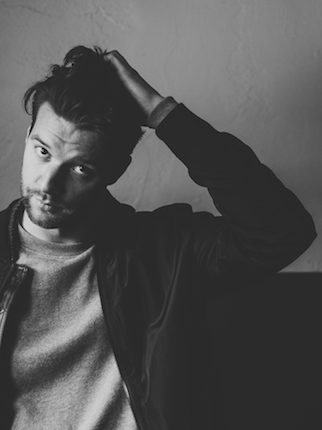Jody Wisternoff and the Anjunadeep Imprint
In the early days of electronic music, deep melodic house—the kind of abyssal sounds that evoke emotional responses and raise the hairs on the backs of our necks—was a mainstay. But for the past 20 years, deep house has been living in shadows cast by its bigger, more popular brethren. Akin to the cosmos themselves, deep house has taken its time to develop, slowly and surely evolving, maturing, and becoming the future sound of legend. Jody Wisternoff, who started his musical career in the 1980s at the young age of 13, has been a driving force in the most recent revival of the genre. Joining forces with arguably the most successful deep group on planet Earth, Above & Beyond, together they are forging a new path for deep house out of the shadows of underground clubs and onto the main stage.
“It’s deep house’s turn. All the genres have had their shine in the limelight. If you stick to what you do for long enough, you become fashionable at one point again. It’s the 20-year cycle.”
When you started off your music career as a teenager, what was the biggest challenge that you faced?
Convincing my parents to let me take another day off from school so I could figure out how to use a sampler. It was different back then; it was an incredible thing to be doing. I was lucky to be given a publishing advance from Smith & Mighty, who were the hot Bristol name at the time. They saw potential in my little brother and myself. We were 12 and 16. They laid $10,000 on us. Imagine being given $10,000 when you’re 16 years old to buy studio equipment. It blew my little mind. It was a honeymoon period for the next 10 years, just trying to figure everything out. How to use the equipment without any formal training was difficult. Back then, you couldn’t just hop on YouTube and look up a tutorial on how to chop up a breakbeat and sample it. It was just something I had to figure out as I went along. I didn’t figure out how to properly work a compressor until I owned one for four years. I was literally going in blind and messing around, but that’s how the best things happen, isn’t it? That’s how dub came about, by people not playing the game and doing things you aren’t supposed to be doing. It’s all about abusing your equipment. That’s when happy accidents take place.

When you go to the proverbial drawing board, what artists do you draw inspiration from to create your style and sound?
I like to hop on YouTube and look at documentaries. This week, I’ve been looking at the original dub pioneers like Lee Scratch Perry, because they were thinking outside the box. So props to those mad renegades of sound. But next week it will be something different. You constantly discover and rediscover incredible artists, then you obsess for a while until you realize there is so much more out there.
How did you first get involved with the Anjunadeep label?
The first time I did something with them was when they signed Fausto Fanizza, about four years ago. My manager phoned me and said there was this label that was interested in working with me, and I was like, “Yeah, they seem like cool guys.” I had no idea they were spearheaded by one of the superpowers of Above & Beyond at the time. From there everything fell into place, and I’ve been with them ever since, progressing at every stage. Then just last year, they asked me if I wanted to get involved with their compilations. I was happily obliged as long as it wouldn’t affect my relationship with James Grant. His DJ style was changing into the faster stuff as a natural progression for him, and the label wanted to stay downtempo to push the deep house vibes—establish the label more and keep bringing it into a more explorative territory—and it seems to have worked out really well. A lot of people are playing our records that weren’t a couple of years ago, and it’s amazing to see how things are progressing.
As a deep house artist, how has it been for you to hear some deep tracks played mid-set on the main stages at some of the largest festivals in the world?
A few years ago, this wouldn’t have happened—because deep house was being played in the chill-out room, or the stuff you play in the warmup—but no way would you get away with playing something at 120 BPM at 3am. You’re likely to get booed off stage, but it depends where you are. Even years ago in places like Argentina, you could get away with doing stuff like that, but generally it’s seen as either afterhours or warmup. So it’s really cool that people are willing to vibe on slightly lower BPMs. The melodic stuff has been constant; it’s a thread that’s always been there, but it’s kind of like the BPM and the groove have become more sophisticated and more mature. I feel like we’re all growing up just a little bit.
People are projecting the next subgenre of house to hit the top of the charts to be deep house. Why is it only now that deep house is getting popular?
If you go back to the early New York house labels like Nu Groove and Strictly Rhythm and stuff like that, it was all deep house, and that’s way back in the ’80s. Perhaps it’s because a large sector of the audience has grown up and matured, and they were the type of kids that maybe came through with the big-stage EDM stuff. Give them three years down the line, and that could be the case. That’s how it happens quite often: There’s like a gateway drug, and there there’s something slightly more enjoyable and sophisticated. I think this is a testament to the quality in the music in general. It’s the type of music that has a bit more substance. It touches people’s spirit and their soul; it’s very cosmic. The cream of the crop always rises to the top. Then again, when something is viewed as the next big thing, it’s really dead already because the backlash is right around the corner. But it’s deep house’s turn. All the genres have had their shine in the limelight. If you stick to what you do for long enough, you become fashionable at one point again. It’s the 20-year cycle.
What is your favorite venue to play?
It’s easier to say favorite country. [Laughs] I like this really intimate kind of family-affair party I do every year. It’s this boat party on the River Thames called “Twisted Audio” at the Golden Jubilee and Yacht Club. It’s about 500 people, and we just get right on it.
Festivals or clubs?
There are advantages to both. The great thing about festivals is that you get to hang out and meet people; it’s much more of a social event. You get to bump into your peers at festivals. At a club you’re generally the headliner and that’s it, but I think at festivals the sets are a bit short and you’re one of many. Clubs are more fun, more personal, and a bit darker, so if you’re having a bad hair day it doesn’t matter at a club.
What’s the worst job you had before DJing?
I worked in a record shop. The tricky thing was hiding all the preludes, because that was the reason I was working in a record shop—to get the hot new tunes. The manager was like, “You have to sell these,” and I was like, you have to be joking! I wanted to keep them all for myself.
What’s the best thing a fan has ever done for you?
Well, my wife is upstairs, so I can’t really tell you about that. It was something from my pre-married days. But lately, there’s this program that is linked to the Anjunadeep homepage where people can gift things. I was recently given a ring, and someone else sent me a piece of paper with a drawing of the Anjunadeep label. We attract a really strong following of very generous clubbers who give me their favorite trinkets.
Follow Jody Wisternoff on Facebook | Twitter





